Unit 2 Sporting events Grammar and usage情态动词课件(46张)
文档属性
| 名称 | Unit 2 Sporting events Grammar and usage情态动词课件(46张) | 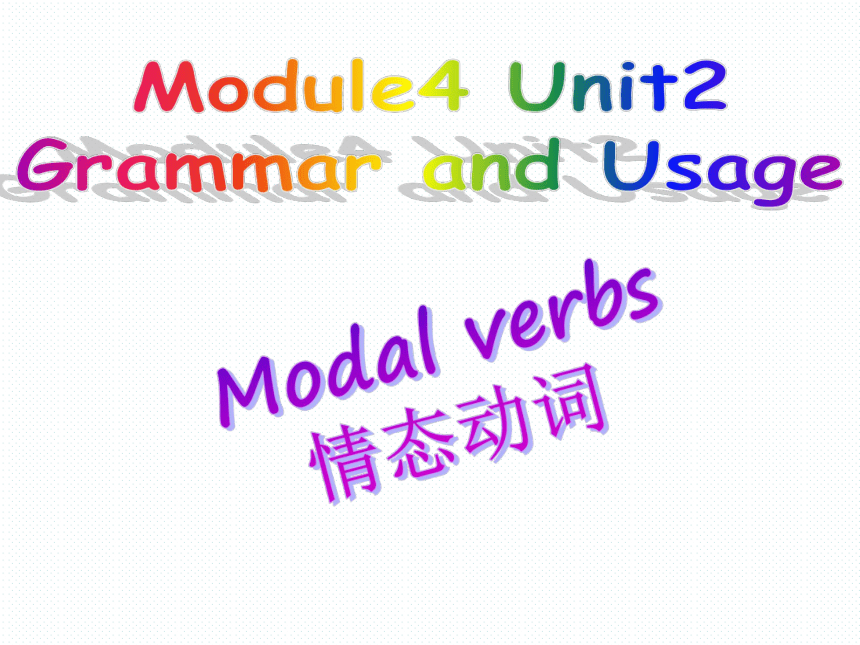 | |
| 格式 | zip | ||
| 文件大小 | 894.5KB | ||
| 资源类型 | 教案 | ||
| 版本资源 | 牛津译林版 | ||
| 科目 | 英语 | ||
| 更新时间 | 2019-07-25 22:41:56 | ||
图片预览



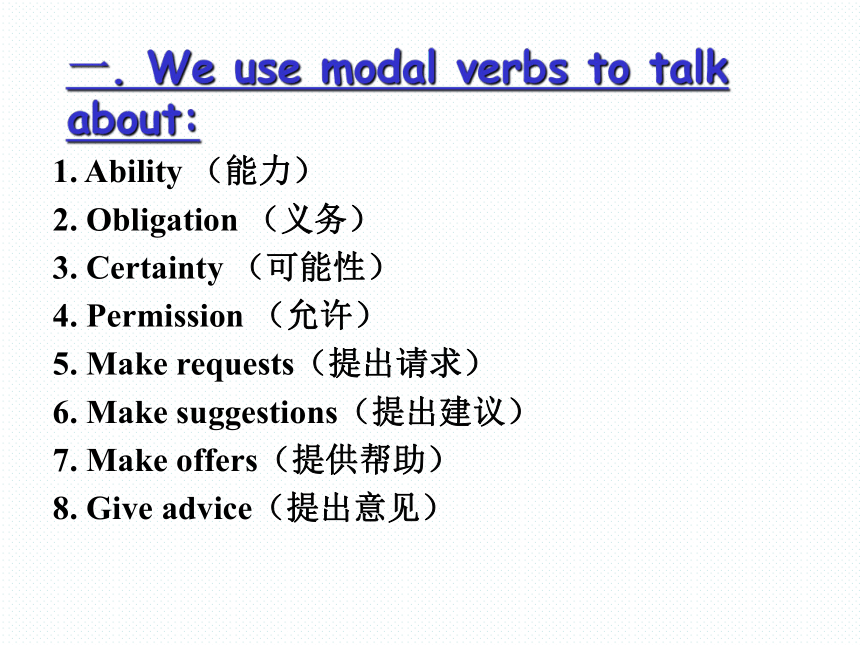
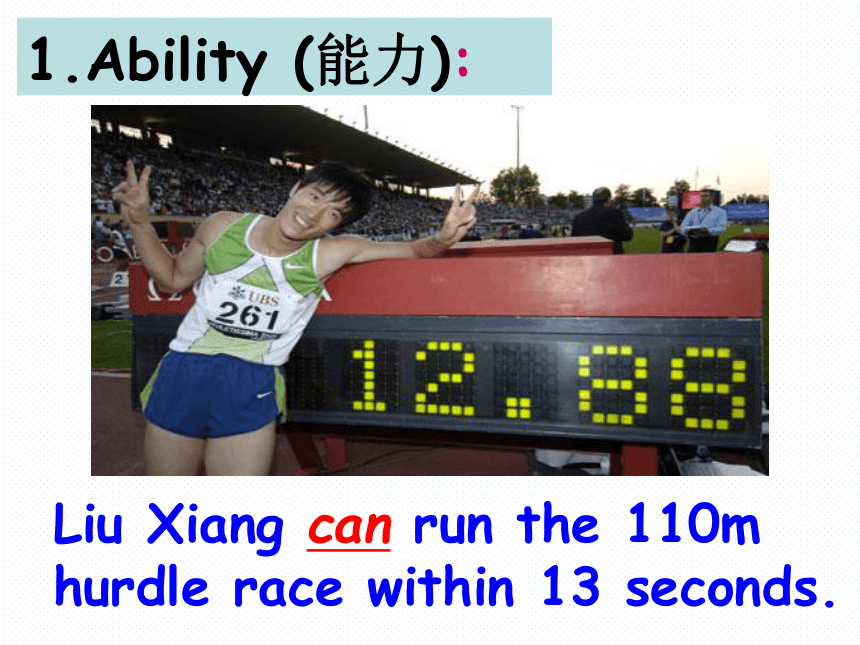
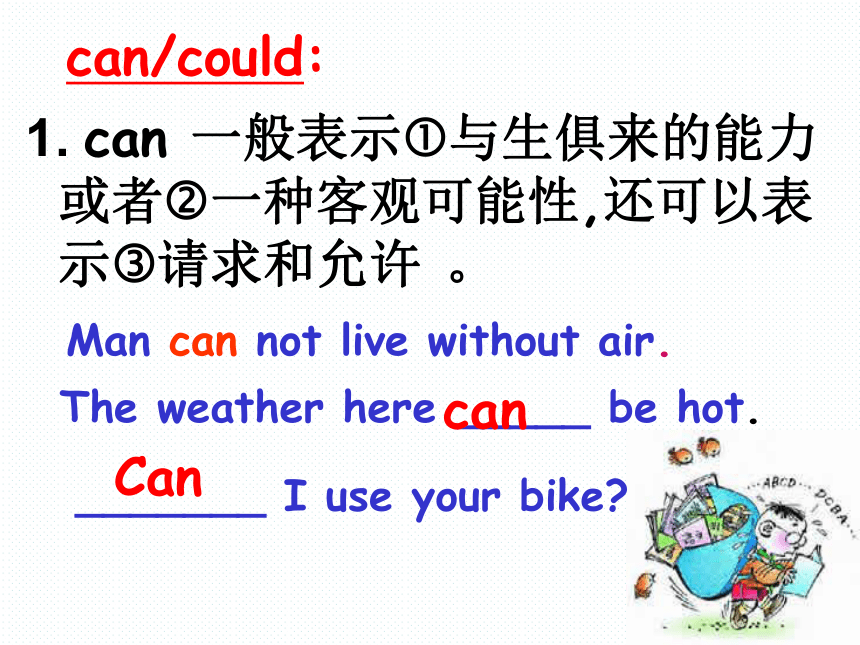
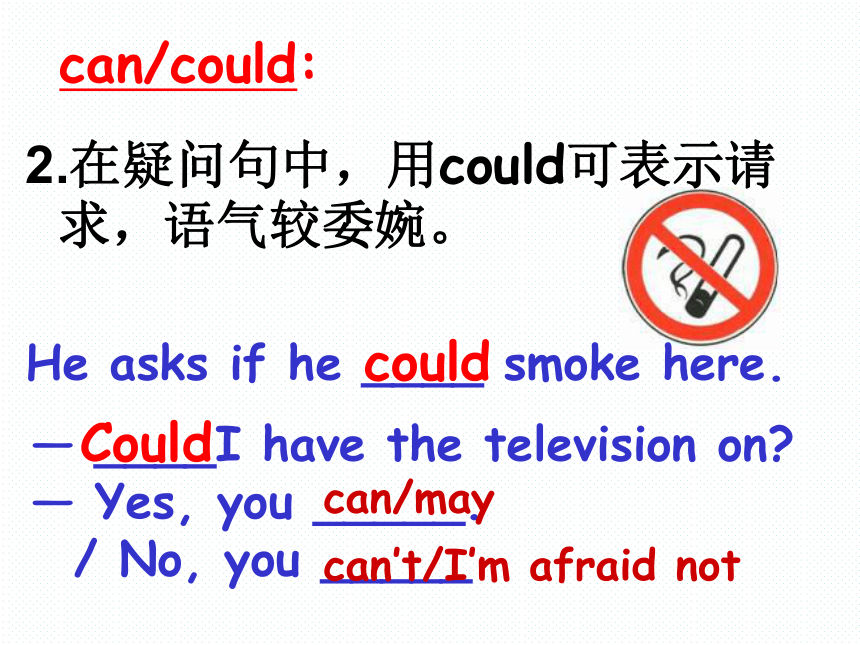
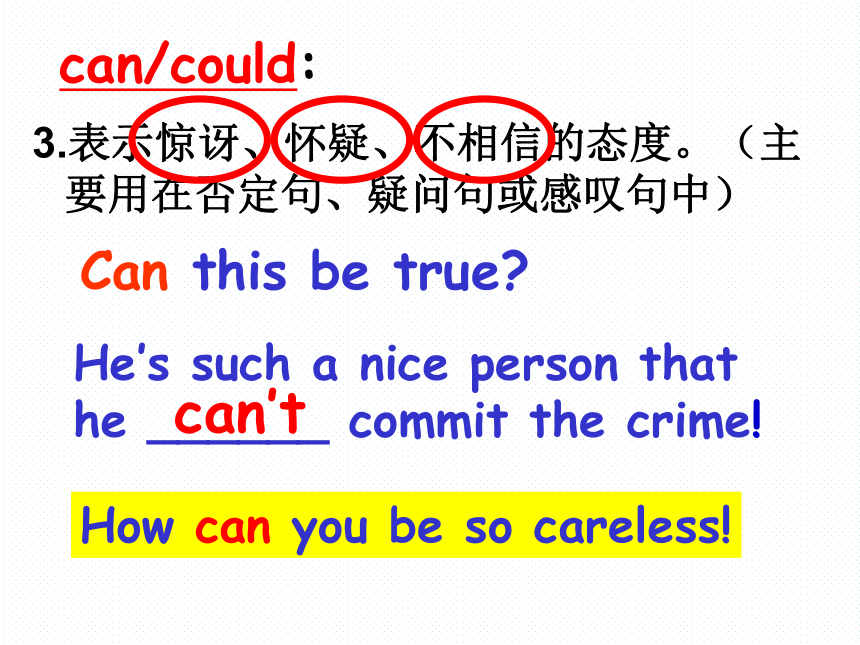
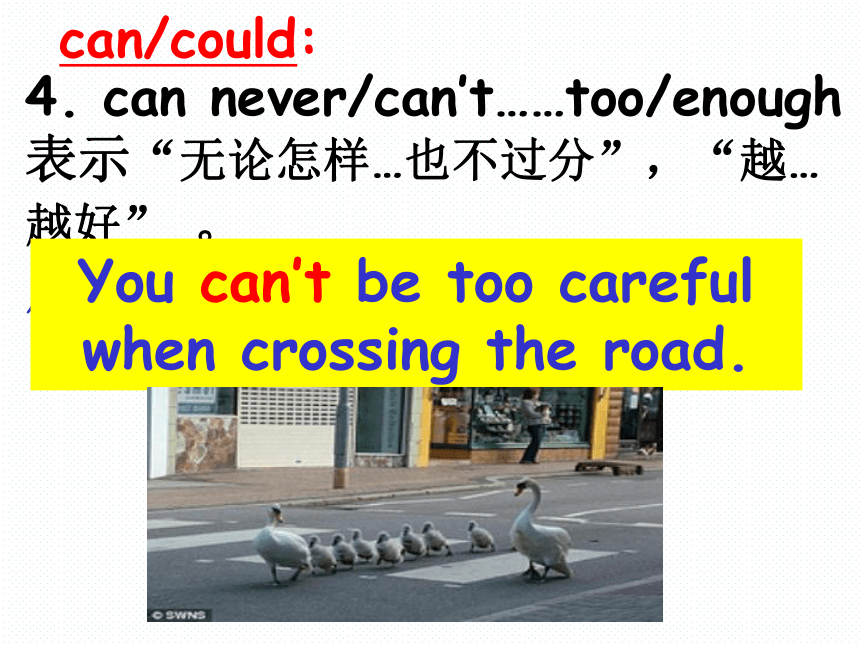


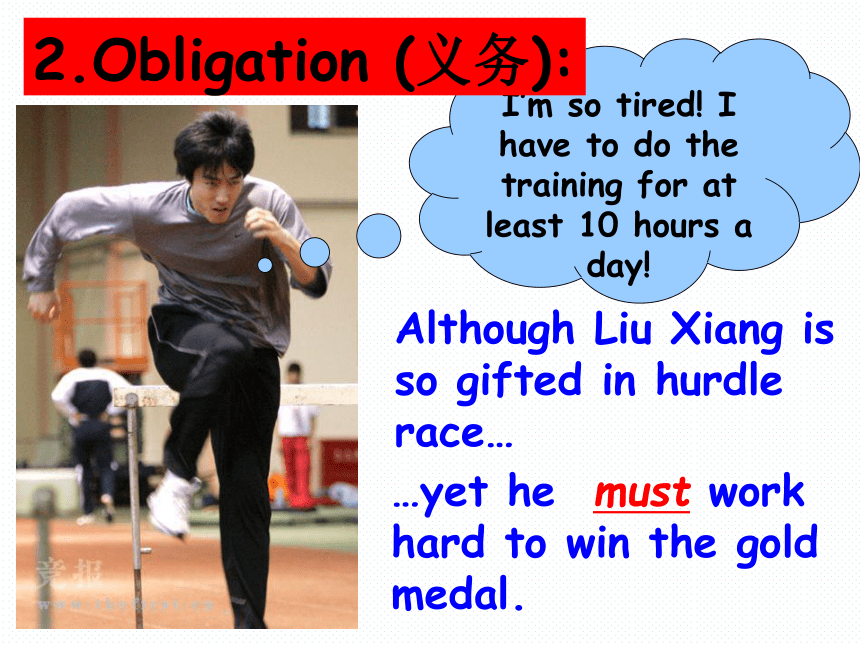
文档简介
课件46张PPT。Module4 Unit2
Grammar and UsageModal verbs
情态动词Learning Goals1. 掌握情态动词基本意义及用法。
2. 掌握情态动词特殊意义及用法。
3. 在情境中体验和参与分析和解决问题,提高语言运用能力。Guess2. He won a god medal in Olympic games and 36 world champions in his career.3. He broke the world record in 2006.4. He suffered from great injuries and retired in 2015.5. He is good at 110-metre hurdles.1. He made great achievements in track and field.Who is he?一. We use modal verbs to talk about:1. Ability (能力)
2. Obligation (义务)
3. Certainty (可能性)
4. Permission (允许)
5. Make requests(提出请求)
6. Make suggestions(提出建议)
7. Make offers(提供帮助)
8. Give advice(提出意见)
1.Ability (能力):Liu Xiang can run the 110m hurdle race within 13 seconds.can/could:1. can 一般表示?与生俱来的能力或者?一种客观可能性,还可以表示?请求和允许 。The weather here _____ be hot.canMan can not live without air. _______ I use your bike?Cancan/could:2.在疑问句中,用could可表示请求,语气较委婉。— ____I have the television on?
— Yes, you _____.
/ No, you _____CouldHe asks if he ____ smoke here.couldcan/maycan’t/I’m afraid notcan/could:3.表示惊讶、怀疑、不相信的态度。(主要用在否定句、疑问句或感叹句中) He’s such a nice person that he ______ commit the crime! can’t你怎么会如此地粗心! How can you be so careless! Can this be true? can/could:4. can never/can’t……too/enough表示“无论怎样…也不过分”,“越…越好” 。你过马路的时候再小心也不为过。 You can’t be too careful when crossing the road. Attention:can/be able to区别:Edison always wondered why hens could hatch (孵) chickens while he was not able to.Question: Are the two modal verbs interchangeable (互换) ? If not, why?can表示与生俱来的能力或一种客观可能,(一般)而be able to更加强调通过后天的学习和努力获得的能力 ,或者在某个客观的场合和背景下(具体),能做到的事情。Attention:can/be able to区别:A big fire broke out in ABC hotel yesterday. Luckily, everyone __________ run out of the building.was able to2. She _____ speak both English and French.canI’m so tired! I have to do the training for at least 10 hours a day! 2.Obligation (义务):…yet he must work hard to win the gold medal.Although Liu Xiang is so gifted in hurdle race…Attention:advisabilitynecessityought to/shouldhave tomustYour mother brings you up and takes good care of you, so when she is old, you ___ look after her in return. A.can B.may C.have to D.must Shi Dongpeng might win a medal at the Olympic Games.Although the chance of winning a medal is small, I’ll try my best! 3.Certainty (可能性) :Attention:very uncertainalmost certainmightshouldmustmaycould1.He _____ be at home.2.He _____ be at home, for he just called me from his home 15 seconds ago.A.may B.might C.must A.may B.might C.must (can)must 表示肯定的猜测,译为“一定”,不能用于否定句或疑问句。
This must be your pen.
He must be doing his homework now.
He must have arrived already.must特殊含义及用法must2. 表示“坚持”(常用于固定句型:If you must do sth. “如果你非要做某事”)
如果你真的要走,那就悄悄离开。If you must leave, do it quietly.Attention:—They___ be doing the experiment in the lab.
—Why?
—Because the lights are still burning.A.could B.can
C.must D.would 4.Permission (允许):May I eat KFC if I win the gold medal?may/might:1. 表示许可。表示请求、允许时,might比may的语气更委婉一些。— Might/May I use your computer?
— Yes, you can.
/No, you can’t/mustn’t. may/might:2.用于祈使句中表示祝愿。3.表示推测、可能(只用于肯定句,疑问句则要用can或could)。 祝你成功! May you succeed. He may be very busy now. May you be happy all your life. 5.Making requests (提出要求):Can you help me with my training?I don’t know how to use this equipment! will can could wouldinformalformal6.Making suggestions (提出建议):Shall we do the training in the morning?It’s too hot to take exercise in the afternoon. shall:1.shall用于第一、第三人称疑问句中,表示说话人征求对方的意见、向对方请示或提供帮助 。1.Shall we begin our lesson?
2.When shall he be allowed to leave hospital?
3.Shall I carry this bag for you?shall:2.Shall用于第二、第三人称,表示说话人给对方命令、警告、允诺或威胁。 You shall fail if you don‘t work harder.
He shall be punished according to the rule.
等我读完这本书,就会给他的。
He shall have the book when I finish it.警告威胁允诺7.Making offers (提供帮助):Don’t worry, dear, I will wash them right away.Mom, my dirty clothes have been piled up! I don’t have time……will/would:1. 表示请求、建议等,would比will委婉客气。sentence
pattern Would you please…Would you mind…sb would rather…Would you like…will/would:2.表示意志、愿望和决心。 I will never do that again. will/would:3.可表示经常性、习惯性、倾向性。翻译为“经常、惯于、总是”。1).The old man _______have a smoke under a big tree every afternoon after he finished his farm work. would2).门就是打不开 ! The door won’t open. will/would:Attention:I will go to the park with you tomorrow if you will offer me lunch. Question: Is this sentence correct? Why?情态动词表示 “意愿”8.Giving advice (提出意见):You should not/ought not to eat so much before running.How delicious!!!should /ought to:1.should表示劝告、建议、命令,其同义词是ought to;在疑问句中,通常用should代替ought…to。Should I open the window? 我们应当要相互学习。 We should learn from each other.should:2.情态动词should用于第一人称时可以表示说话人的一种谦逊、客气、委婉的语气。 —By the way, who is your idol?
—Liu Xiang, I should say.3. should表示意外或惊讶 常译为
“居然,竟然”。
I can’t believe such a gentleman should be so rude to the old.
should:我不敢相信这样一个绅士居然对老人如此无礼。
should:---When can I come for the photos ? I need them tomorrow afternoon.
---They _____be ready by 12 : 00 .
A. can B. should
C. might D. need
4. should 表示猜测时,一般指按经验或逻辑判断,
翻译成“照说应该,估计,想必” How can we deal with exercises about modal verbs?Functions & usage of modal verbsLanguage context (上下文、语境)ThinkingFunctions & usage of modal verbsLanguage context (上下文、语境)Let's have a try!( )1. ---May I sit beside you, sir?
--- No, you ______. My girlfriend is coming soon.
A. can’t B. mustn’t C. needn’t D. shouldn’t
( )2.-- _____ I speak to Mary, please?
--Sorry, she____ come to the phone because she isn’t in.
A. Might; won’t B. Can’t; mustn’t C. May; can’t D. Couldn’t; shouldn’t
( )3. --- I want to know if I _____ smoke here.
--- No, you____ . Could you see the sign “NO SMOKING” there?
A. can; needn’t B. must; can’t
C. shall; won’t D. may; mustn’t
( )4. My wife never remembers my telephone number. She always ____ look it up.
A. must B. should C. would D. has to( )5. --- ____ you pass me the English magazine, please? --- Sure. Here you are.
A. Could B. Need C. Must D. Might
( )6. It’s nearly seven o’clock . Jack ___ be here at any moment.
A. could B. need C. should D. will
( )7. They will ______ run this machine on their own in three months.
A. can B. could C. may D. be able to( ) 8. That big cinema ______ seat 2,000 people.
A. can B. should C. ought to D. is able to
( )9 — Could I borrow your dictionary?
— Yes, of course you _______.
A. might B. will C. can D. should
( )10. — Might I watch TV after supper?
— Yes, you ________.
A. may B. must C. might D. canTo be continued…
情态动词表示推测语气和虚拟语气的用法。HomeworkReview the usage of modal verbs and finish the rest exercise on the learning plan.Thank you!表示否定的情态动词的用法:
部分情态动词的否定式是情态动词中的考点
之一。
mustn’t 不准, 禁止
needn’t 没必要 ( = don’t have to )
can’t 不能; 不可能
may not 不可以; 可能不
shouldn’t 不应该 ( = ought not to )情态动词表推测的反意疑问句,简单来说,就是以情态动词后的时态为准,如句子里有明确的时间状语,则以其为准。以 must 为例:
eg.
1. He must be watching TV , isn’t he ?
2. Tom must have lived her for a long time, hasn’t he ?
3. She must have arrived yesterday, didn’t she?*情态动词表推测的反意疑问句
Grammar and UsageModal verbs
情态动词Learning Goals1. 掌握情态动词基本意义及用法。
2. 掌握情态动词特殊意义及用法。
3. 在情境中体验和参与分析和解决问题,提高语言运用能力。Guess2. He won a god medal in Olympic games and 36 world champions in his career.3. He broke the world record in 2006.4. He suffered from great injuries and retired in 2015.5. He is good at 110-metre hurdles.1. He made great achievements in track and field.Who is he?一. We use modal verbs to talk about:1. Ability (能力)
2. Obligation (义务)
3. Certainty (可能性)
4. Permission (允许)
5. Make requests(提出请求)
6. Make suggestions(提出建议)
7. Make offers(提供帮助)
8. Give advice(提出意见)
1.Ability (能力):Liu Xiang can run the 110m hurdle race within 13 seconds.can/could:1. can 一般表示?与生俱来的能力或者?一种客观可能性,还可以表示?请求和允许 。The weather here _____ be hot.canMan can not live without air. _______ I use your bike?Cancan/could:2.在疑问句中,用could可表示请求,语气较委婉。— ____I have the television on?
— Yes, you _____.
/ No, you _____CouldHe asks if he ____ smoke here.couldcan/maycan’t/I’m afraid notcan/could:3.表示惊讶、怀疑、不相信的态度。(主要用在否定句、疑问句或感叹句中) He’s such a nice person that he ______ commit the crime! can’t你怎么会如此地粗心! How can you be so careless! Can this be true? can/could:4. can never/can’t……too/enough表示“无论怎样…也不过分”,“越…越好” 。你过马路的时候再小心也不为过。 You can’t be too careful when crossing the road. Attention:can/be able to区别:Edison always wondered why hens could hatch (孵) chickens while he was not able to.Question: Are the two modal verbs interchangeable (互换) ? If not, why?can表示与生俱来的能力或一种客观可能,(一般)而be able to更加强调通过后天的学习和努力获得的能力 ,或者在某个客观的场合和背景下(具体),能做到的事情。Attention:can/be able to区别:A big fire broke out in ABC hotel yesterday. Luckily, everyone __________ run out of the building.was able to2. She _____ speak both English and French.canI’m so tired! I have to do the training for at least 10 hours a day! 2.Obligation (义务):…yet he must work hard to win the gold medal.Although Liu Xiang is so gifted in hurdle race…Attention:advisabilitynecessityought to/shouldhave tomustYour mother brings you up and takes good care of you, so when she is old, you ___ look after her in return. A.can B.may C.have to D.must Shi Dongpeng might win a medal at the Olympic Games.Although the chance of winning a medal is small, I’ll try my best! 3.Certainty (可能性) :Attention:very uncertainalmost certainmightshouldmustmaycould1.He _____ be at home.2.He _____ be at home, for he just called me from his home 15 seconds ago.A.may B.might C.must A.may B.might C.must (can)must 表示肯定的猜测,译为“一定”,不能用于否定句或疑问句。
This must be your pen.
He must be doing his homework now.
He must have arrived already.must特殊含义及用法must2. 表示“坚持”(常用于固定句型:If you must do sth. “如果你非要做某事”)
如果你真的要走,那就悄悄离开。If you must leave, do it quietly.Attention:—They___ be doing the experiment in the lab.
—Why?
—Because the lights are still burning.A.could B.can
C.must D.would 4.Permission (允许):May I eat KFC if I win the gold medal?may/might:1. 表示许可。表示请求、允许时,might比may的语气更委婉一些。— Might/May I use your computer?
— Yes, you can.
/No, you can’t/mustn’t. may/might:2.用于祈使句中表示祝愿。3.表示推测、可能(只用于肯定句,疑问句则要用can或could)。 祝你成功! May you succeed. He may be very busy now. May you be happy all your life. 5.Making requests (提出要求):Can you help me with my training?I don’t know how to use this equipment! will can could wouldinformalformal6.Making suggestions (提出建议):Shall we do the training in the morning?It’s too hot to take exercise in the afternoon. shall:1.shall用于第一、第三人称疑问句中,表示说话人征求对方的意见、向对方请示或提供帮助 。1.Shall we begin our lesson?
2.When shall he be allowed to leave hospital?
3.Shall I carry this bag for you?shall:2.Shall用于第二、第三人称,表示说话人给对方命令、警告、允诺或威胁。 You shall fail if you don‘t work harder.
He shall be punished according to the rule.
等我读完这本书,就会给他的。
He shall have the book when I finish it.警告威胁允诺7.Making offers (提供帮助):Don’t worry, dear, I will wash them right away.Mom, my dirty clothes have been piled up! I don’t have time……will/would:1. 表示请求、建议等,would比will委婉客气。sentence
pattern Would you please…Would you mind…sb would rather…Would you like…will/would:2.表示意志、愿望和决心。 I will never do that again. will/would:3.可表示经常性、习惯性、倾向性。翻译为“经常、惯于、总是”。1).The old man _______have a smoke under a big tree every afternoon after he finished his farm work. would2).门就是打不开 ! The door won’t open. will/would:Attention:I will go to the park with you tomorrow if you will offer me lunch. Question: Is this sentence correct? Why?情态动词表示 “意愿”8.Giving advice (提出意见):You should not/ought not to eat so much before running.How delicious!!!should /ought to:1.should表示劝告、建议、命令,其同义词是ought to;在疑问句中,通常用should代替ought…to。Should I open the window? 我们应当要相互学习。 We should learn from each other.should:2.情态动词should用于第一人称时可以表示说话人的一种谦逊、客气、委婉的语气。 —By the way, who is your idol?
—Liu Xiang, I should say.3. should表示意外或惊讶 常译为
“居然,竟然”。
I can’t believe such a gentleman should be so rude to the old.
should:我不敢相信这样一个绅士居然对老人如此无礼。
should:---When can I come for the photos ? I need them tomorrow afternoon.
---They _____be ready by 12 : 00 .
A. can B. should
C. might D. need
4. should 表示猜测时,一般指按经验或逻辑判断,
翻译成“照说应该,估计,想必” How can we deal with exercises about modal verbs?Functions & usage of modal verbsLanguage context (上下文、语境)ThinkingFunctions & usage of modal verbsLanguage context (上下文、语境)Let's have a try!( )1. ---May I sit beside you, sir?
--- No, you ______. My girlfriend is coming soon.
A. can’t B. mustn’t C. needn’t D. shouldn’t
( )2.-- _____ I speak to Mary, please?
--Sorry, she____ come to the phone because she isn’t in.
A. Might; won’t B. Can’t; mustn’t C. May; can’t D. Couldn’t; shouldn’t
( )3. --- I want to know if I _____ smoke here.
--- No, you____ . Could you see the sign “NO SMOKING” there?
A. can; needn’t B. must; can’t
C. shall; won’t D. may; mustn’t
( )4. My wife never remembers my telephone number. She always ____ look it up.
A. must B. should C. would D. has to( )5. --- ____ you pass me the English magazine, please? --- Sure. Here you are.
A. Could B. Need C. Must D. Might
( )6. It’s nearly seven o’clock . Jack ___ be here at any moment.
A. could B. need C. should D. will
( )7. They will ______ run this machine on their own in three months.
A. can B. could C. may D. be able to( ) 8. That big cinema ______ seat 2,000 people.
A. can B. should C. ought to D. is able to
( )9 — Could I borrow your dictionary?
— Yes, of course you _______.
A. might B. will C. can D. should
( )10. — Might I watch TV after supper?
— Yes, you ________.
A. may B. must C. might D. canTo be continued…
情态动词表示推测语气和虚拟语气的用法。HomeworkReview the usage of modal verbs and finish the rest exercise on the learning plan.Thank you!表示否定的情态动词的用法:
部分情态动词的否定式是情态动词中的考点
之一。
mustn’t 不准, 禁止
needn’t 没必要 ( = don’t have to )
can’t 不能; 不可能
may not 不可以; 可能不
shouldn’t 不应该 ( = ought not to )情态动词表推测的反意疑问句,简单来说,就是以情态动词后的时态为准,如句子里有明确的时间状语,则以其为准。以 must 为例:
eg.
1. He must be watching TV , isn’t he ?
2. Tom must have lived her for a long time, hasn’t he ?
3. She must have arrived yesterday, didn’t she?*情态动词表推测的反意疑问句
